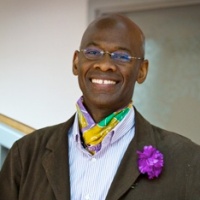41st Annual MLK Celebration Leadership Award Recipient: Michel DeGraff
Michel DeGraff
Professor of Linguistics
41st Annual MLK Leadership Award

Professor of Linguistics Michel DeGraff was honored with a faculty MLK Leadership Award for his innovative study of the value of native-language instruction in Haiti’s schools.
“When I was growing up, in a middle-class family and in my school, Creole wasn’t viewed as a real language,” says DeGraff, a founding member of Haiti’s newly created Haitian Creole Academy (Akademi Kreyòl Ayisyen). “It was a given that you could only be successful in French.”
Over the years, many observers have disparaged Haitian Creole as a primitive tongue incapable of expressing complex concepts, while linguists have generally asserted that it is descended from a pidgin language. DeGraff emphatically disputes this. He has spent years presenting evidence that Haitian Creole is just as sophisticated as other languages, publishing papers in journals such as Language, Language in Society, Linguistic Anthropology and Linguistic Typology.
DeGraff’s research on Creole has only reinforced his hands-on interest in education. In connection with a National Science Foundation (NSF) grant, he is working with a school in a remote mountain village on Haiti’s La Gonave island to test Creole-language instruction among fourth graders. The project uses computer programs to teach math in Creole, while avoiding the practice of rote memorization that often accompanies French-language teaching.
Comments on My Acceptance of the MIT Martin Luther King Jr. Leadership Award
By Michel DeGraff
MIT Faculty Newsletter, Vol. XXVII No. 3, January / February 2015
I am from Haiti. In Haiti, when we enter a room and greet our audience, we say, in Haitian Creole, “Onè,” which means that we honor each and all of you in the audience. And the audience responds “Respè” as a show of respect. So let’s all give it a try: “Onè . . .
Respè . . . ”
Now I’d like to say "Mèsi anpil!" (i.e., Thank you very much!) to the organizers of this beautiful lunch. Thank you as well to MIT for this long tradition, which started long before we had a national MLK Jr. Day. In this tradition, we at MIT celebrate Martin Luther King Jr. with both words and actions. I would also like to thank the anonymous colleagues who nominated me and who wrote letters on my behalf. I also thank my MIT department, Linguistics and Philosophy, and the School of Humanities, Arts and Social Sciences. And I especially want to thank my MIT-HAITI team. We are a pretty large group across all of MIT and in Haiti. At MIT the team includes allies in various units: from MIT Sloan to Linguistics to the School of Science, the School of Engineering, the Office of Digital Learning, the Teaching and Learning Lab, etc. In Haiti, we work in close collaboration with educators across a wide range of public and private universities and with leaders in the Haitian Government, especially the Ministry of National Education. Together we are developing, evaluating and disseminating state-of-the-art digital resources in Haitian Creole for active-learning methods in Haiti.
I’ll soon give you some historical background and more details on these efforts, which live up to the spirit of Martin Luther King Jr.’s legacy that we are celebrating today. But before that, I’d like to insist that without our MIT-Haiti team, I could not have gotten this award. This award is not mine, it’s OURS: it’s an award to our teamwork, teamwork with amazing colleagues at MIT and in Haiti who so strongly believe that together we can change the world as we confront a formidable global challenge.
“One dream can change the world.” This is the tagline of the inspiring movie Selma about Martin Luther King Jr., which I saw recently.